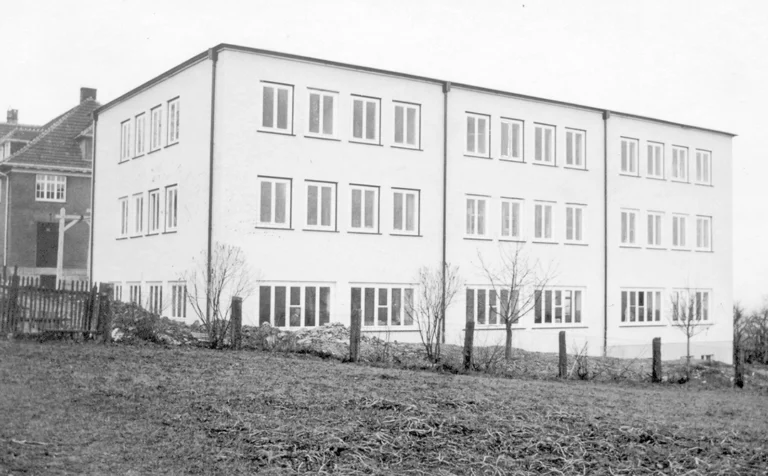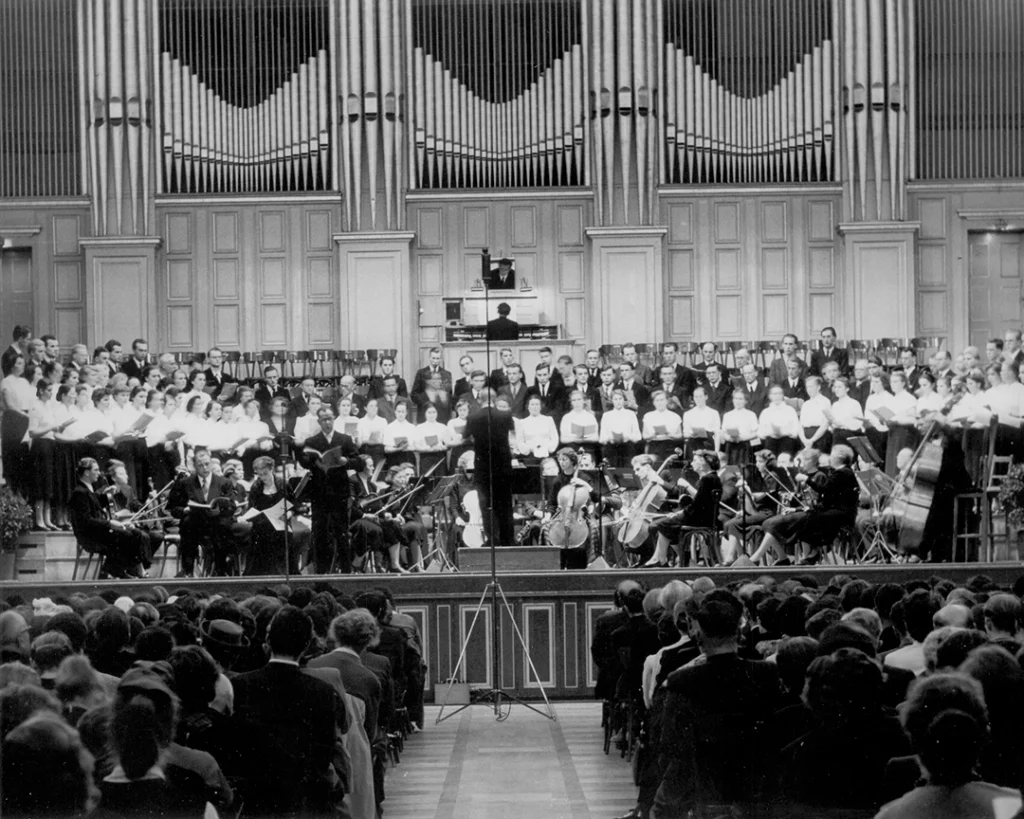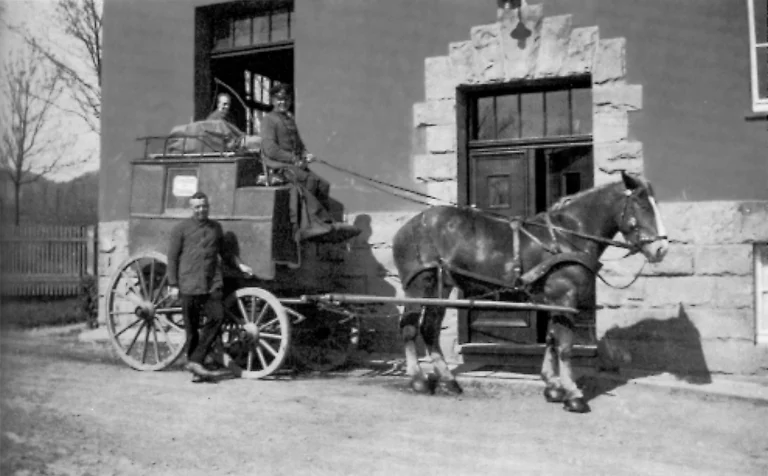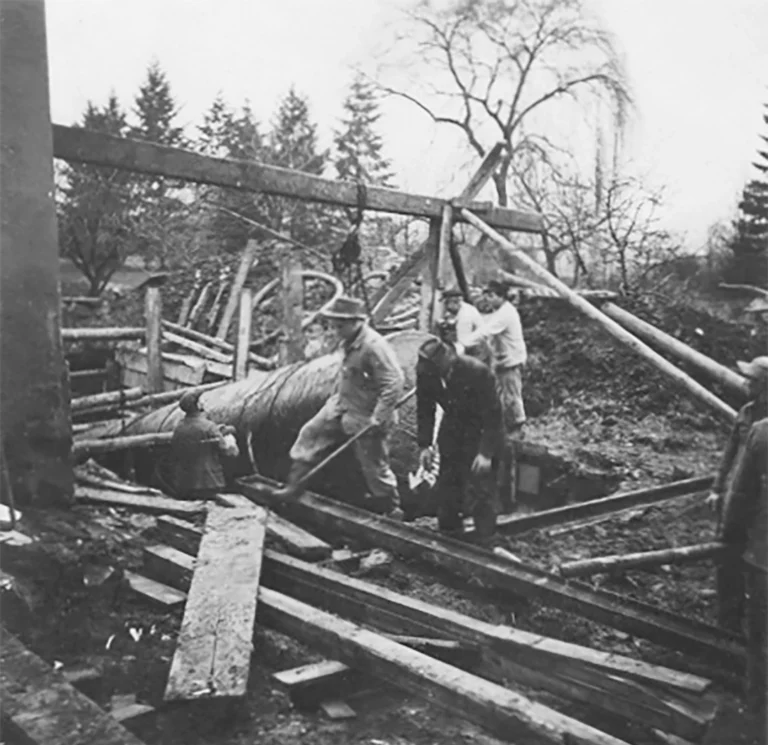Between Conformity and Non-Compliance
Bärenreiter Verlag during the National Socialist era
“I do not flatter myself that I was always immune to the incredibly powerful mass suggestion of Nazi propaganda. It disgusts me that today, everyone is pretending already to have seen through National Socialism in the early years or even before 1933.”[i] Karl Vötterle’s emotional 1947 statement on the “Third Reich” and his position during this period obliges us, as a later generation, and particularly those of us who have not themselves experienced the living and working conditions in a totalitarian state, to take a reflective, considered approach to the events taking place between 1933 and 1945. It is obvious that post-war sources such as Vötterle’s book Haus unterm Stern (“The House Under the Star”) offer a different interpretation than documents from the Nazi period, but this should not automatically be judged as a retrospective attempt on Vötterle’s part to conceal that he was in fact a Nazi follower or hanger-on. Vötterle bore responsibility for himself, his family, his company and not least for around one hundred employees – it would be presumptuous to criticize him for not abandoning everything and emigrating or even joining the open resistance. In their ambivalence, his actions are like those of many other people during that time.[ii]
Despite the rapid Gleichschaltung – forcible coordination – of all public life after Hitler seized power in 1933, Bärenreiter Verlag was initially able to continue its operations without too much trouble; only the Finkensteiner Bund (“Finkenstein Association”), which had emerged from the Singbewegung around Walther Hensel, was forcibly dissolved, which also put an end to the journal Die Singgemeinde. However, Vötterle skilfully and cool-headedly diverted these activities to the Arbeitskreis für Hausmusik (“Working Group for Domestic Music”), which was founded specifically for this purpose. Under this innocuous name, the group presented itself as “harmless”, and performed both early and modern church music at the newly initiated Kasseler Musiktage unperturbed. In 1934, a year of economic recovery, the publishing house celebrated its tenth anniversary, and 1936 saw the publication of its one thousandth article. Bärenreiter clearly profited from the fact that from the very beginning, “the national cause in music”sup>[iii] had been part of its profile; Nazi ideology could hardly find fault with this, and conversely, Vötterle and the followers of the Singbewegung initially saw some of their key concerns supported by National Socialism, although admittedly they had never pursued any political goals. The tightrope walk this entailed, however, is illustrated by a dispute that ignited in 1952, long after the end of the War, over a statement by Karl Vötterle: “Whatever one’s attitude to Adolf Hitler’s total state, whatever one’s individual experiences with it may have been, the decisive thing is that at that time, young people were successfully won over to join in common activities, to organize their leisure time creatively.”[iv] In response, Theodor W. Adorno levelled grave and sweeping accusations at Vötterle, denouncing him as a direct precursor of the Hitler Youth and denying that any relativization of the Nazi regime’s atrocities was possible.[v] Vötterle in turn saw these accusations – which Adorno was not the first to make – as a violation of his personal integrity: “There are people who […] reject all and any work done in the last 12 years, no matter how good, and claim that it gives off the bloody stench of Nazi rule.”[vi] He claimed to have offered the “most effective resistance” through his “preservation of the good” – by which he meant Christian values as well as early and new (church) music, for example.[vii]
That Bärenreiter was not above ingratiating itself with the National Socialists is evident, for example, in the fact that its 1936 complete catalogue included a portrait of Hitler (which was also available as a postcard), as well as in the publication of several songbooks that were produced in cooperation with state institutions and toed the party line. But although this undoubtedly contributed to stabilizing the system, we cannot infer that it indicated unconditional allegiance. Vötterle was accused of being a member of the Reiter-SA (1936–1938) and of the NSDAP (from 1937 onwards), and not only in the post-war denazification proceedings. However, in these proceedings he was able to convince the court that neither membership had been due to his ideological convictions or political will, but that he would not have been able to fulfil his simple desire to go riding any other way because Germany’s clubs and associations had all been co-opted by the Nazis, and that he had never suspected how this would be construed later on. His joining the Reiter-SA was soon followed by a call to “voluntarily” join the Party. Caution is required when interpreting the portrait of Hitler, too. We can ask whether the inclusion of the Führer in a postcard series otherwise dedicated exclusively to composers and scenes of music-making should not in fact be seen as a tactical concession made in the face of an immediate threat, for shortly beforehand the very existence of Bärenreiter-Verlag had been at stake. As naive as Vötterle’s later argument with regard to the goals of the Singbewegung was, the regime’s cruelty had already become apparent to him and his staff in 1935, for on August 18 his magazine Der Sonntagsbrief (“The Sunday Letter”) took a more or less open stand against the National Socialists’ euthanasia program. Vötterle’s publication of sacred works by Hugo Distler and other contemporary composers and of theological writings had already aroused the suspicion of the local NSDAP cadres and led to harassment, and in December 1935 he and Paul Gümbel, as the magazine’s editors, were expelled from the Reich Press Chamber. This would have destroyed both their careers and probably the entire publishing house as well. It was only thanks to the mediation of high-ranking officials of the Reich Chamber of Music and the Ministry of Propaganda that the decision was reversed in early 1936 – at the price of the formal dismantling of the Bärenreiter company: Vötterle sold Neuwerk Verlag “not including publications, but including church leaflets and annual newsletters” to the long-time manager of his print shop, Eduard Kurbjuhn, and Johannes Stauda Verlag together with the theological division of Bärenreiter Verlag to his employee Paul Gümbel, in order to ensure “the proper continuation” of the work he had begun.[viii] Only Der Sonntagsbrief had to be passed into foreign hands; it was discontinued at the turn of the year 1936/37.
Room for manoeuvre repeatedly opened up for Vötterle – a leeway he was able to exploit to his own tactical advantage. This was due both to the contradictions within the Party’s cultural policy, most of which were caused by rivalries, and not least to Vötterle’s many useful contacts. Despite ongoing repressive measures, he was thus able to continue his publication program; in 1939, he embarked on an official distribution cooperation with his Jewish friend Albert Dann, who had fled to Palestine, and in 1943 was still publishing compositions by Heinrich Kaminski, who was classed as a “quarter Jew”, and whose works no one else would print. In addition to this, Vötterle took “comfort in grand plans”:[ix] as early as 1943, an advertisement went out calling for subscriptions to the encyclopaedia Die Musik in Geschichte und Gegenwart, and the catalogue compiled in September 1944 lists the first volumes of the series Das Erbe deutscher Musik as well as forthcoming complete editions of the works of Gluck, Handel, Monteverdi, Pergolesi, de la Rue, Schein, Spohr, Telemann, and Johann Walter – albeit with the note that the “inclusion of a work […] in no way” means “that it is available for delivery now or in the foreseeable future”.
The longer the War went on, the greater the threats became: in the autumn of 1943, Vötterle’s series of cultural events in Kassel was banned; on October 22, the city was reduced to rubble in a major attack – Bärenreiter’s premises on the Wilhelmshöhe escaped, but the company was forced to join into a wartime labour pool; paper for music had run out long since. There was no lack of private adversity, either: on February 1, 1944, Vötterle’s wife Maria died after a long and serious illness; he had already lost his father and father-in-law in 1942. Feeling shackled by the Nazi regime, in March 1944 Vötterle made arrangements to move the publishing house to Switzerland. Paul Sacher and August Wenzinger helped to found the company’s Basel branch, which as a precaution was provided with publishing rights and supplies. In September, Vötterle was sent to the Siegfried Line as a labourer in the earthworks, and following his return home in November he was drafted into the Wehrmacht as a driver. His diary entries from the first weeks of 1945 bear witness to his worry about his four children, the publishing house’s buildings, the sheer effort required to get through each day – no optimism remained, only the will to persevere. Utter catastrophe came late and unexpectedly: shortly before the end of the War, on the night of March 8–9, 1945, the last bombs fell on Kassel and destroyed everything: the publishing house, the print shop, and Vötterle’s home.
As daylight rose on the tragedy, Reverend Bernhard Martin, who was a magazine editor for Johannes-Stauda-Verlag, took up pen and paper: “Words fail under the impact of such overwhelming doom. Nevertheless, my friend, let us trust in God’s love!”[x] This idea of trust and confidence, formulated not least with a feeling of relief at having escaped with one’s life, became Karl Vötterle’s motto during a time that was anything but easy for him, despite the return of peace and the opportunity to make a fresh start. Due to his membership in the NSDAP, he was forced to undergo denazification proceedings in early 1947. He was initially classed as a hanger-on, for while he had suffered “considerable non-material damage and probably also severe mental strain”, the court did not consider “these disadvantages” to be “sufficient” to exonerate Vötterle completely.[xi] The verdict’s reasoning rather strangely was based not on Vötterle’s conduct, which was described as impeccable, but on the degree of repression he had suffered, and was felt to be unjust not just by his friends and publishing staff, but also by several of those involved in the trial in a judicial capacity. It was challenged accordingly and overturned following a retrial.
By November 1947, Vötterle had been rehabilitated and was allowed to work as a publisher once more. Two and a half years after the end of the War, he had regained his entrepreneurial freedom, the massive restriction of which had probably been the cause of his greatest suffering during the National Socialist era.
Gudula Schütz
[i] Karl Vötterle, Defence in Appeals Chamber Proceedings, typescript [1947], p. 3 (Vötterle estate).
[ii] Sven Hiemke carried out a more detailed investigation in “Folgerichtiges Weiterschreiten”. Der Bärenreiter-Verlag im “Dritten Reich”, in: Bärenreiter-Almanach. Musik-Kultur heute. Positionen – Profile – Perspektiven, Kassel et al. 1998, pp. 161–170.
[iii] Vötterle, Haus unterm Stern 41969, p. 128.
[iv] Vötterle, In letzter Stunde, in: Die Hausmusik 16, 1952, p. 2.
[v] Theodor W. Adorno, Kritik des Musikanten, in: Dissonanzen, Göttingen 1956, pp. 62–101.
[vi] As in note 1, closing remarks.
[vii] Vötterle, Zwölf Jahre Bärenreiter-Verlag Kassel. Tatsachen aus den Jahren 1935–1947, typescript October 13, 1947, p. 4 (Vötterle estate).
[viii] Vötterle and Paul Gümbel, circular sent to friends and associates, May 1936 (Vötterle estate).
[ix] Vötterle, Bärenreiter-Verlag Kassel, Entwicklungsgeschichte, typescript May 27, 1971 (Vötterle estate).
[x] Autograph (Vötterle estate); also in Bärenreiter-Bote 11, 1945–1947, p. [2].
[xi] Judgment of Spruchkammer IV Kassel-Stadt, February 1, 1947, transcript (Vötterle estate).




